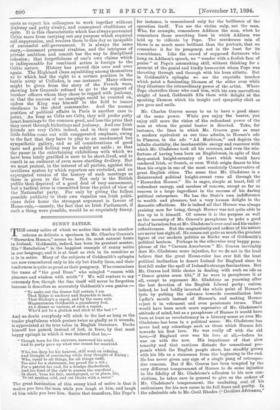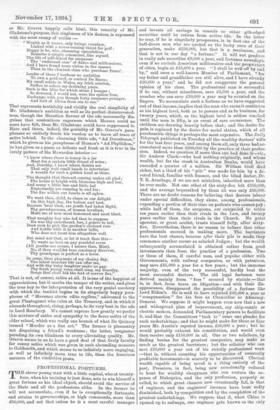SUNNY SATIRE. T HE sunny satire of which we notice this
week in another column so delicate a specimen in Mr. Charles Graves's " H.awarden Horace," seems to have its most natural home in Ireland. Goldsmith, indeed, has been its greatest master. His " Retaliation " is the happiest example of sunny satire in our language, and it is at least as rich in its sunshine as it is in satire. Many of the subjects of Goldsmith's epitaphs are now remembered only in his sly but kindly lines, and their tenderness is quite as great as their pungency. Who remembers the name of "the good Dean" who mingled "reason with pleasure and wisdom with mirth" P We will venture to say extremely few, though the line itself will never be forgotten because it describes so accurately Goldsmith's own genius :— "To make out the dinner full certain I am That Ridge is anchovy and Reynolds is lamb, That Hickey's a capon, and by the same rule Magnanimous Goldsmith a gooseberry fool. At a dinner so various, at such a repast, Who'd not be a glutton and stick to the last P"
And no doubt everybody will stick to the last as long as the tender playfulness which praises twice as gladly as it wounds, is appreciated at its true value in English literature. Burke himself has gained, instead of lost, in fame, by that most happy epitaph in which it was declared that he,—
" Though born for the universe, narrowed his mind, And to party gave up what was meant for mankind.
Who, too deep for his hearers, still went on refining,
And thought of convincing while they thought of dining ; Who, equal to all things, for all things unfit, Too nice for a statesman, too proud for a wit ; For a patriot too cool, for a drudge disobedient, And too fond of the right to pursue the expedient, In short, 'twas his fate, unemployed, or in place, Sir, To eat mutton cold, and out blocks with a razor."
The great fascination of this sunny kind of satire is that it makes you love the man while you laugh at him, and laugh at him while you love him. Satire that transfixes, like Pope's for instance, is remembered only for the brilliance of the operation itself. You see the victim only, not the man.
Who, for example, remembers Addison the man, when he remembers those scorching lines in which Addison was held up to ridicule by Pope. The murderous rain of
blows is so much more brilliant than the portrait, that we remember it for its pungency, not in the least for its resemblance. Like the crowd of supposed flatterers who hung on Addison's speech, we "wonder with a foolish face of praise" at Pope's astonishing skill, without thinking for a moment of the genial and kindly humourist whom Pope was thrusting through and through with his keen stiletto. But in Goldsmith's epitaphs we see the exquisite touches which paint a fascinating likeness of the sitter even while they illustrate the extraordinary power of the artist. Where Pope electrifies those who read him, with his own marvellous sleight of hand, Goldsmith fills them with delight at the speaking likeness which his insight and sympathy elicit as you gaze and smile.
Mr. Charles Graves seems to us to have a good share of the same power. While you enjoy the banter, you enjoy still more the vision of the redundant power of the man at whom the genial banter is directed. Take, for instance, the lines in which Mr. Graves goes as near a modern equivalent as our time admits, to Horace's ode to Plancus, in the ode "Ad Morleium," and depicts the infinite elasticity, the inexhaustible energy and resource with which Mr. Gladstone took all his reverses, and even the mis- fortune of having been born an Englishman, in spite of that deep-seated knight-errantry of heart which would have rendered Irish, or Scotch, or even Welsh origin dearer to him than his origin in one of the most resolutely Conservative of great English cities. The sense that Mr. Gladstone is a disinterested political knight-errant runs all through the " Hawarden Horace." He is eager, simple at heart, full of redundant energy, and careless of renown, except so far as renown is a large ingredient in the success of his daring political enterprises. He has the Stoic's own indifference to wealth and pleasure, but a very human delight in the domestic affections. He is indeed all that Horace was always praising men for being, though Horace was not quite able to live up to it himself. Of course it is the purpose as well as the necessity of Mr. Graves's paraphrase to poke a good deal of harmless fun at Mr. Gladstone's over-zeal and his under- reflectiveness. But the magnanimity and ardour of his nature are never lost sight of. He comes out quite as much the greatest figure of our modern politics as Burke was of Goldsmith's political horizon. Perhaps in the otherwise very happy para- phrase of the "Carmen ArncebEeum " Mr. Graves inevitably does Mr. Gladstone some injustice, for we do not in the least believe that the great Home-ruler has ever felt the least political inclination to desert Ireland for England since he first fell under the spell of Ireland's strange fascinations. But Mr. Graves had little choice in dealing with such an ode as "Donee gratus eram tibi," if he were to paraphrase it at all, except to represent Mr. Gladstone as yearning after the lost devotion of the English Liberal party ; unless, indeed, he had boldly inverted the whole point of Horace's lyric by putting the advance towards reconciliation into Lydia's mouth instead of Horace's, and making Horace reject it in vehement and even passionate terms. That would have been much more expressive of Mr. Gladstone's attitude of mind, but as a paraphrase of Horace it would have been at least as revolutionary in a literary sense as ever Mr. Gladstone has been in a political sense. Mr. Gladstone has never had any relentings such as those which Horace felt towards his first love. He was really off with the old love,—if England ever was his love at all,—before he was on with the new. His impatience of that slow tenacity and that cautious distaste for sensational pro- posals which the English people show, has steadily grown with his life as a statesman from the beginning to the end. He has never given any sign of a single pang of retrospec- tive remorse. But if Mr. Graves has been tempted by the very different temperament of Horace to do some injustice to the fidelity of Mr. Gladstone's adhesion to his new con- victions, he takes care in general to give us the ardour of Mr. Gladstone's temperament, the unabating zeal, of his enthusiasm for his new cause in its full force and purity- In the admirable ode to Mr. Cecil Rhodes (" Camillus Africanus," as Mr. Graves happily calls him), this tenacity of Mr. Gladstone's purpose, this singleness of his desires, is expressed with the most sunny of smiles :— " Wealth as it waxes, only brings vexation,
Linked with a never-ceasing thirst for poll: Happy is ho, who, shunning speculation, Remains a simple commoner, like myself. The life of self-denial far surpasses The 'cushioned ease' of dukes and millionaires, And I have found more virtue in the masses
Than in the cleanest class who purchase Pears'.
Leader of these I harbour no ambition To own a gold-reef, or control De Beers;
My small estate in Wales, my Irish mission, Suffice to solace my declining years. Such is the bliss for which alone I hunger ; So dowered, I would not, were the option free, Exchange with you though forty summers younger,
And lord of Africa from sea to sea."
That represents truthfully and vividly the real simplicity of Mr. Gladstone's ambition as well as its perfect disinterested- ness, though the Horatian flavour of the ode necessarily dis- guises that contentious eagerness which Horace could no more have felt, than Mr. Gladstone could have suppressed it. Here and there, indeed, the geniality of Mr. Graves's para- phrases so entirely floods his version as to leave all trace of satire behind. In the charming little ode, "Ad Dorotheam," which he gives as his paraphrase of Horace's "Ad Phyllidem," he has given us a poem as delicate and fresh as it is true in its lovely picture of the Hawarden interior :— "I know where there is honey in a jar Meet for a certain little friend of mine ; And, Dorothy, I know where daisies are That only wait small hands to intertwine A wreath for such a golden head as thine.
The thought that thou art coming makes all glad; The house is bright with blossoms high and low, And many s, little lass and little lad
Expectantly are running to and fro : The fire within our hearts is all aglow.
We want thee, child, to share in our delight On this high day, the holiest and hest, Because 'twas then, ere youth had taken flight, Thy grandinamrua, of women loveliest, Made me of men most honoured and most blest.
That naughty boy who led thee to suppose He was thy sweetheart, has, I grieve to tell, Been seen to pick the garden's choicest rose And toddle with it to another belle, Who does not treat him altogether well.
But mind not that, or let it teach thee this— To waste no love on any youthful rover (All youths are rovers, I assure thee, Miss). No. if thou wouldst true constancy discover, Thy grandpapa is perfect as a lover.
So come, thou playmate of my closing day,
The latest treasure life can offer me, And with thy baby laughter make us gay.
Thy fresh young voice shall sing, my Dorothy, Songs that shall bid the feet of sorrow flee."
That is Dot, of coarse, satire at all. It is one of the happiest of appreciations, but it marks the temper of the writer, and gives the true key to the interpretation of the very genial mockery with which the booklet begins in its singularly happy para- phrase of " Miecenas atavis edite regibus," addressed to the great Plantagenet who rules at the Treasury, and in which it abounds throughout, rising, perhaps, to its very best in the ode to Lord Rosebery. We cannot express how greatly we prefer this mixture of satire and sympathy to the fierce satire of the older school, which was really one branch of what De Quincey termed "Murder as a fine art." The former is pleasantry not disguising a friend's weakness ; the latter, vengeance parading its own blindness to every alleviating quality. Mr.
Graves seems to us to have a good deal of that lively faculty for sunny satire which was given in such abounding measure to Goldsmith, and which seems to us infinitely more engaging, as well as infinitely more true to life, than the ferocious sarcasm of the vindictive poets.



















































 Previous page
Previous page